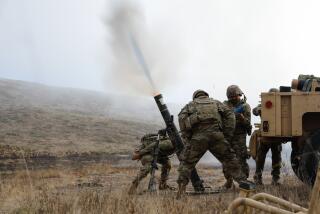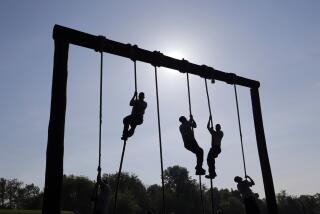Home Base
- Share via
PORT HUENEME — In June, Jessica Johnson, 16, and her 17-year-old brother David will have to pack their clothes, books and music and say goodbye to their friends at Hueneme High School.
For the fourth time they are moving because of their dad’s Navy duties--this time to Mississippi. And they aren’t looking forward to it.
“It hurts to move,” David said. “I don’t want to leave my friends and make new ones.”
Jessica said her “jolly” personality helps her make friends easily, but she still doesn’t want to leave.
Some youths say military life is exciting, since it enables them to travel to places other children can’t even imagine. But most, including Jessica and David, say it is a constant challenge, one that forces them to move frequently and make new friends.
And wherever they are, adolescents have to adjust to life on a military base, where strict rules and regulations guide their after-school and weekend play.
During the past several years of base closures and sudden reassignments, the Navy has made a nationwide effort to improve the quality of life for military personnel and their children. In 1994, the Pentagon pledged $2.7 billion to renovate base youth centers and recreation programs and modernize housing over the next six years.
And Ventura County is benefiting from the tail end of that money, with a new teen center at the Naval Construction Battalion Center in Port Hueneme opening this weekend and a youth center planned for the Point Mugu Naval Air Weapons Station this summer.
The teen center, the first of its kind in Ventura County, is open to 12- to 17-year-old dependents of military or civilian personnel working on the bases. It will serve youths from the bases at Port Hueneme and Point Mugu and the naval housing complex in Camarillo. The center--a converted community building for enlisted sailors--cost the Navy about $20,000.
$2.6-Million Youth Center at Point Mugu
This summer, the Navy will also finish building a $2.6-million youth facility for 5- to 12-year-olds at Point Mugu, which will add more than 10,000 square feet to the current building and offer before- and after-school care, summer camp, open recreation hours after school and team sports.
Currently, there are youth centers at both Point Mugu and Port Hueneme. But officials say the Point Mugu center is small and overcrowded. And while teens often spend time at the children’s centers, they don’t have their own place to go.
John Gerard, deputy director of morale, welfare and recreation for both bases, said the Navy wanted to open a facility just for teens.
“We’ll tell you teens can do a lot on the base,” Gerard said. “But they’ll tell you there’s absolutely nothing to do.”
In some ways, Ventura County’s two military bases are like miniature cities, complete with fitness centers, bowling alleys, libraries, movie theaters and fast-food restaurants. Youths can play in organized sports, join Scout troops or hang out at the food courts or Navy Exchange.
But the youths say whatever they do, it’s too regulated by Navy rules. They say they must show identification everywhere they go, abide by a 10 p.m. curfew enforced by military police and receive parental permission to let friends inside the gate.
“It’s kind of a bummer ‘cause you can’t do anything without ID,” said 10-year-old Chris Morgan, who lives on base at Point Mugu. “And you also can’t go anywhere but the base ‘cause there are long, long roads to everywhere.”
Jamar Belcher, 14, said he often goes to the Hueneme youth center but that little kids always interrupt him and his friends when they watch videos.
Julio Dilan, 16, said he feels like he has no freedom living at Port Hueneme and that he is confined to the base.
“It’s hard because I feel like I’m caged in here,” Julio said. “People are always watching and police are always patrolling.”
Parents, however, like the secure and safe environment of the military base.
Five Moves Over Past 10 Years for Family
Mary Pizzi, who has two children ages 7 and 8, said she likes knowing the Point Mugu guards will keep out “the extra people.”
“I feel more secure here on the base,” Pizzi said. “I don’t have to worry about the same things I would in a normal neighborhood.”
And Debra Higgins, mother of three, said she allows her children a little more freedom than she would if they lived outside the fence.
Despite the benefits of living on base, Higgins said raising children in the military is tough because of frequent moves. Over the past 10 years, her husband’s duties have forced them to move five times. She said the most recent move was especially hard on her children, including 11-year-old Jake Wenzel.
“It’s not really good, because when I get new best friends, I have to say goodbye to them,” Jake said.
Richard Bard Elementary Principal John Puglisi said the transiency hurts some children, and allows others to learn and grow. About one-third of students at his Port Hueneme school are from military families, many of whom live on base.
“Moving from one place to another can be beneficial and enlightening for a lot of kids because they get to go to a lot of places and be in a lot of socioeconomic and cultural contexts,” Puglisi said. “But where there are existing difficulties or problems, then those things will be exacerbated.”
The mobility can really affect high school students, Hueneme High School counselor Marcie Duncan said. She said students who move even once during high school are twice more likely to drop out.
She said military teens are usually more introverted and tend to cling together. So she helps them adjust to the school and the area by introducing them to other students, teaching them how to use public transportation and showing them around campus.
Desire to Provide a Safe Place for Teens
Base officials say the new teen center will be a safe--and supervised--place to go after school. The Navy doesn’t have statistics on juvenile crime on local bases, but Gerard said Navy officials and parents are concerned about substance abuse among teens, and want to provide a special, supervised place for teens to go.
Educational aide Harold Hulton said he believes the center will prevent teenagers from getting into trouble.
“So many things can go wrong with teens, like drugs, pregnancy,” Hulton said. “[The center] will give them something to do, a positive option.”
There is an upside to life in a military family, some teens said. They say they get to experience life in cities around the nation, or the world, while their nonmilitary classmates may have only lived in Ventura County.
Michelle Depatie, 14, has lived in Paris, Washington, Hawaii and the Middle East. She said she doesn’t have any trouble adapting, and enjoys meeting new people and seeing different places.
But she said every time she moves to a new city, she seeks out children in military families as friends.
“I feel more related to them,” Michelle said. “They know how you feel and that you have moved around a lot.”
She likes life on the base because housing is free, movies are cheap, and everything is within walking distance, including the new teen center.
The center has billiards and Ping Pong tables, computers, televisions, soft drink machines, video games and an outdoor courtyard with barbecue grills. In addition to offering open recreation hours after school and on Saturdays, the center will hold special events, including dances, movie nights and card tournaments.
“It’ll be a sanctuary for teens,” Michelle said. “A place for us to get away from the outside real world and meet new people.”
More to Read
Sign up for Essential California
The most important California stories and recommendations in your inbox every morning.
You may occasionally receive promotional content from the Los Angeles Times.










